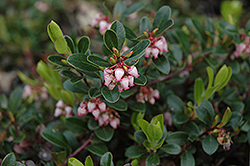Radiant Bearberry
Arctostaphylos uva-ursi 'Radiant'
Height: 12 inches
Spread: 3 feet
Sunlight:
![]()
![]()
Hardiness Zone: 5
Other Names: Kinnikinik; Common Bearberry
Description:
A high quality groundcover for poor sandy or acidic soils, forms a thick carpet of green with interesting leaves which turn red in fall; very dainty pinkish flowers in spring and bright red berries in summer through fall; very specific growing conditions
Ornamental Features
Radiant Bearberry features dainty nodding pink bell-shaped flowers at the ends of the branches in mid spring. It features an abundance of magnificent red berries from late summer to late fall. It has forest green evergreen foliage. The small glossy round leaves turn an outstanding red in the fall, which persists throughout the winter.
Landscape Attributes
Radiant Bearberry is a dense multi-stemmed evergreen shrub with a ground-hugging habit of growth. Its relatively fine texture sets it apart from other landscape plants with less refined foliage.
This is a relatively low maintenance shrub, and should not require much pruning, except when necessary, such as to remove dieback. It has no significant negative characteristics.
Radiant Bearberry is recommended for the following landscape applications;
- Groundcover
Planting & Growing
Radiant Bearberry will grow to be about 12 inches tall at maturity, with a spread of 3 feet. It tends to fill out right to the ground and therefore doesn't necessarily require facer plants in front. It grows at a slow rate, and under ideal conditions can be expected to live for approximately 30 years.
This shrub does best in full sun to partial shade. It is very adaptable to both dry and moist growing conditions, but will not tolerate any standing water. It is very fussy about its soil conditions and must have sandy, acidic soils to ensure success, and is subject to chlorosis (yellowing) of the foliage in alkaline soils, and is able to handle environmental salt. It is somewhat tolerant of urban pollution. This is a selection of a native North American species.
